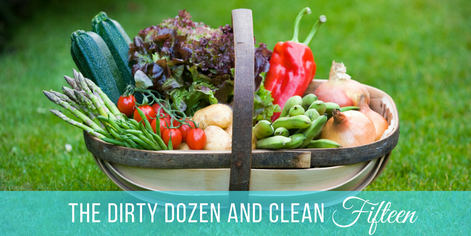The answer is, it depends.
Some people are more sensitive to chemicals in foods because of other factors in their health, like autoimmune conditions, gut issues or liver problems. In certain cases, your body may be less tolerant of having one more thing to detoxify and the chemicals used in food production are just another thing for a burdened body to do. It can even put that person's health over the edge, while others are more resilient.
What is the difference between Organic & GMO?
Organic agriculture practices are those that do not utilize chemical fertilizers, pesticides or other agents; however, they may use 'natural' substances to increase growth and crop yields.
Genetically modified organisms (GMOs) are those that have had their DNA altered in a laboratory, and often include genes from other species. One of the reasons that crops have become genetically modified is in order to withstand direct application of pesticides (eg. glyphosphate ready corn).
What is the issue with GMOs?
We don't totally know the full implications of artificially changing genes. However, one point that is gaining traction in the media is the fact that crops that are grown to withstand direct contact with pesticides will contain those chemicals even after harvest and manufacturing. (Remember the articles about Roundup in Cheerios?)
Apart from concerns about the high levels of exposure to chemicals in food, and how this is overwhelming our liver and other modes of detoxification, we also need to consider the impact that these chemicals are having on our natural healthy bacteria. It is thought that regular exposure to chemicals like glyphosphate are changing our gut bacteria - which we know to be critical to our immune function, nutrient absorption and mental health.
New research is revealing more and more on these topics all the time, so we might have to wait a bit longer for more information. There are even some studies pointing to the idea that gluten intolerance (which many are experiencing) is actually glyphosphate sensitivity. Hmmm interesting....
How do I implement an Organic diet?
In order to reduce chemical exposure, I suggest focusing on eliminating GMOs and the crops with the highest levels of pesticide residue, if you can. Each year the Environmental Working Group updates their list of the "Dirty Dozen" and the "Clean Fifteen" and today they released their list for 2019.
Dirty Dozen 2019
Clean Fifteen 2019
I share this with you so that you can more confidently choose which foods to prioritize or invest in. Please let me know if you'd like to discuss your individual needs in more detail. I always suggest eating vegetables and fruits, regardless of the source. The lists provided are to help you to fine-tune or elevate your healing journey.
The Dirty Dozen
- Strawberries
- Spinach
- Kale
- Nectarines
- Apples
- Grapes
- Peaches
- Cherries
- Pears
- Tomatoes
- Celery
- Potatoes
- Avocados
- Sweet corn (unless it is GMO)
- Pineapples
- Sweet peas (frozen)
- Onions
- Papayas (unless it is GMO)
- Eggplants
- Asparagus
- Kiwis
- Cabbage
- Cauliflower
- Cantaloupes
- Broccoli
- Mushrooms
- Honeydew melons
Happy spring,
Dr. Christa


 RSS Feed
RSS Feed